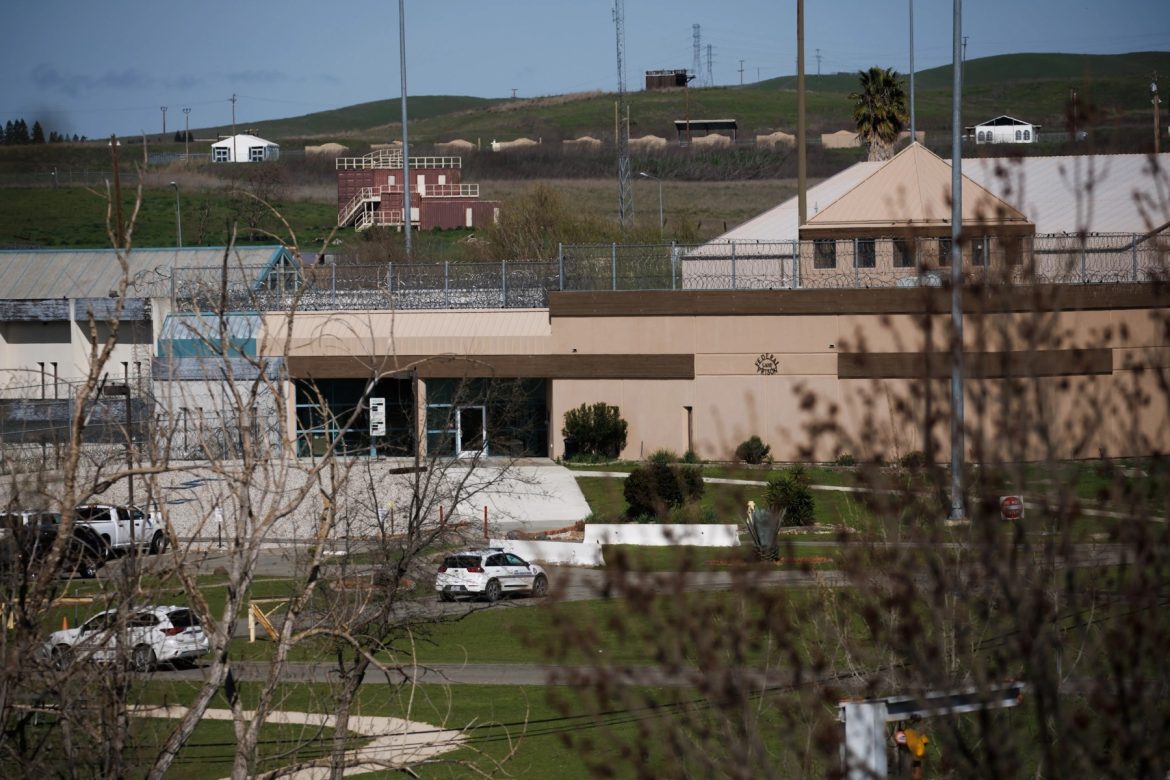“I understand that we’re criminals,” one inmate says. “But we’re still human beings.”
Closing the women’s federal prison in Dublin was supposed to put a swift end to the abuse and dysfunction of the troubled facility. But inmates say the chaotic and hurried transfer of 600 inmates this past week to prisons as far as Minnesota and Miami has wrought suffering all its own.
Prisoners have been sent on grueling cross-country bus trips and flights — some without medical prescriptions or sanitary products, prisoners say — with little sense of their destination.
“We were all bruised up on our wrists because of the fact that they put the handcuffs on so tight and so long,” inmate Vaudencia Hamilton told the Bay Area News Group in a phone call Tuesday from the Miami prison after a three-day journey by bus and plane. She went without her diabetes medication throughout the trip, she said, and felt “dizzy and sick and nauseated.”
Shuttering the federal correctional institution in Dublin comes in the aftermath of a “rape club” culture that led to criminal charges against eight jail officers, seven of whom have since been sentenced. One judge called the facility, also riddled with mold and asbestos, a “dysfunctional mess.”
But as Hamilton put it after her ordeal, “the men went to prison, and we got the punishment.”
Nearly a dozen inmates, most incarcerated on drug charges, and their relatives reached out to the Bay Area News Group over recent days to describe the chaos and anxiety they say the prisoners experienced during the frenetic move.
There was so much confusion during the first days of transfers last week that some inmates languished for upwards of five hours on buses in the Dublin prison parking lot before returning to their cells without explanation. Their only meal was frozen sandwiches, they said. Toilet paper on the bus ran out.
“People were crying. I had anxiety the whole time,” inmate Sara Victoria, 47, told the Bay Area News Group last week after she was stuck on the parked bus. “We just didn’t know where we were going and what we were doing.”
“I have witnessed people fighting. I have witnessed people crying. I have witnessed people drinking pills because they just want to pass out and not think about it. I have witnessed people vomiting,” inmate Maria Morales Rodriguez, 43, said. “Another lady over here next to me, she was cutting herself. We have witnessed all of that. And even officers over here are crying because that’s how crazy it is.”
Inmates with children who live in the Bay Area and were able to visit their loved ones in prison fear they won’t see their kids again. Those with pending release dates to halfway houses worry those plans will be lost in the chaos. And those who formed tight friendships in the prison are panicked about adjusting to new facilities.
“I understand they’re closing down the prison,” inmate Margarita Rosales said. “I understand that we’re criminals. I can totally understand that. But we’re still human beings.”
Benjamin O’Cone, a spokesperson for the federal Bureau of Prisons, declined Monday to answer a list of questions about the inmates’ concerns or the status of the shutdown.
Instead, he reissued a statement from Bureau of Prisons Director Collette Peters saying that despite efforts to address employee misconduct, aging infrastructure and the culture of the prison, the Dublin facility “is not meeting expected standards” so must be closed.
The low-security federal prison has played host to a who’s who of female inmates, from Hollywood Madam Heidi Fleiss to convicted SLA bankrobber Patty Hearst, heiress of the William Randolph Hearst media empire, who was later pardoned by then-President Bill Clinton. Squeaky Fromme and Sara Jane Moore, convicted of trying to assassinate President Gerald Ford, were housed there, and more recently, actresses Lori Loughlin and Felicity Huffman, for their roles in the Varsity Blues college admissions scam.
An inmate rights group, California Coalition For Women Prisoners, filed for an emergency temporary restraining order Friday attempting to halt the transfers, but inmates said that a majority of the prisoners had already been cleared out by Sunday.
It’s unclear how many inmates remain behind Tuesday. Over the course of the scandal, prisoners have filed some 60 civil lawsuits alleging sexual assault.
Removing 600 inmates within a week, the motion said, has “wrought chaos” on a population already at risk of “imminent and serious medical injury, including lack of treatment for serious medical ailments, psychological distress and risk of suicide.”
As part of prison policy, officials said they would attempt to keep inmates “as close to their release locations as possible.”
But Thuy Nguyen, of San Jose, says her sister, inmate Trang Nguyen, was shipped to Miami some 3,000 miles away from her three young children who live in the Bay Area. They visited her nearly every weekend and played together on slides in a prison playground.
Her youngest, a 2-year-old son who has been raised by his father since he was 6 months old, was just starting to connect with her.
“He found a bond and was comfortable with her,” Nguyen said. “And then now all of a sudden it’s not happening.”
On Thursday, Nguyen said her sister was sent by bus from Dublin to Nevada, then flew with about 60 other prisoners to Georgia, then traveled by bus with about half of them another 12 hours to Miami.
“Her hands were tied. Her legs were tied,” Nguyen said of her sister. “Imagine sitting like that for about three days.”

